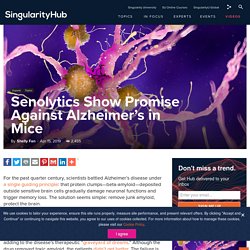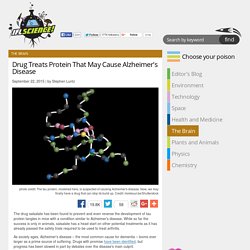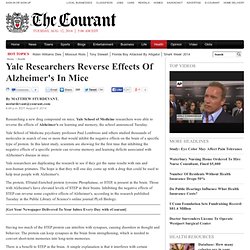

Senolytics Show Promise Against Alzheimer's in Mice. For the past quarter century, scientists battled Alzheimer’s disease under a single guiding principle: that protein clumps—beta-amyloid—deposited outside sensitive brain cells gradually damage neuronal functions and trigger memory loss.

The solution seems simple: remove junk amyloid, protect the brain. They could be completely wrong. Last month, Alzheimer’s disease defeated another promising near-market drug that tried to prevent or remove amyloid deposits, adding to the disease’s therapeutic “graveyard of dreams.” Although the drug removed toxic amyloid, the patients didn’t get better.
The failure is once again spurring scientists to confront an uncomfortable truth: targeting amyloid clumps when patients already show memory symptoms doesn’t work. It’s time to think outside the box. Last week in Nature Neuroscience, Dr. With age, the toxic proteins damaged a particular type of brain cell called OPCs, causing them to transform into cellular monsters that trigger inflammation in the brain. Flashing Light and Sound Reduced Alzheimer’s Symptoms in Mice. Diabetes drug 'significantly reverses memory loss' in mice with Alzheimer's. Drug Treats Protein That May Cause Alzheimer's Disease. The drug salsalate has been found to prevent and even reverse the development of tau protein tangles in mice with a condition similar to Alzheimer's disease.

While so far the success is only in animals, salsalate has a head start on other potential treatments as it has already passed the safety trials required to be used to treat arthritis. As society ages, Alzheimer's disease – the most common cause for dementia – looms ever larger as a prime source of suffering. Drugs with promise have been identified, but progress has been slowed in part by debates over the disease's main culprit.
Debate rages between those who blame the formation of tau protein tangles within neurons, and those who believe a buildup of beta amyloid plaques are the main cause. Alzheimer's breakthrough: Scientists may have found potential cause of the disease in the behaviour of immune cells - giving new hope to millions - Health News - Health & Families - The Independent. Experts said the findings, from Duke University in North Carolina, USA, could “open new doors” in the increasingly frustrated global hunt for a dementia therapy.

The Dutch Village Where Everyone Has Dementia. The town of Hogeway, outside Amsterdam, is a Truman Show-style nursing home.

When Yvonne van Amerongen received a phone call from her mother two decades ago, relaying that her father had died of a heart attack—sudden and painless—one of the first things she thought was, Thank God he never had to be in a nursing home. Van Amerongen was working as a staff member at a traditional Dutch nursing home at the time, getting a front-line view of what she never wanted for her parents. That call from her mother spurred Yvonne into action as she became committed to making nursing homes more livable and less of a departure from reality for their residents. She envisioned a setup as far away as possible from the nondescript buildings and polished floors of her workplace, where everything carried the scent of a dentist’s medical cabinet.
Over the next 20 years, she worked to secure the funding she’d need to make the idea a reality. There are no wards, long hallways, or corridors at the facility. SYK. Yale: Alzheimer's Drug Reverses Cognitive Effects In Mice. Researching a new drug compound on mice, Yale School of Medicine researchers were able to reverse the effects of Alzheimer's on learning and memory, the school announced Tuesday.

Yale School of Medicine psychiatry professor Paul Lombroso and others studied thousands of molecules in search of one or more that would inhibit the negative effects on the brain of a specific type of protein. In this latest study, scientists are showing for the first time that inhibiting the negative effects of a specific protein can reverse memory and learning deficits associated with Alzheimer's disease in mice.
Yale researchers are duplicating the research to see if they get the same results with rats and non-human primates. The hope is that they will one day come up with a drug that could be used to help treat people with Alzheimer's. The protein, STriatal-Enriched protein tyrosine Phosphatase, or STEP, is present in the brain. There is a benefit to STEP in the brain. Arthritis drug halts progression of Alzheimer's disease, scientists find. Alzheimer's brain plaques prevented by lifetime of puzzles, study suggests. A senior man doing a crossword puzzle as his wife washes dishes. iStockphoto (CBS) Doctors always talk about the importance of daily exercise to stay healthy and ward off disease, but when it comes to fitness, are you doing enough to work out your brain?

PICTURES: Alzheimer's disease: 7 things that raise your risk. Diagnosis, Treatments & Prevention. Therapy animals delay progression of dementia symptoms in nursing home residents, study finds. Double homicide at Houston nursing home; victims' roommate ...

A double murder occurred late Tuesday night in a Houston nursing home room shared by four men, according to local authorities. Police arrested Guillermo Correa on suspicion of beating two ... $2 million HIPAA settlement highlights mobile device risks facing healthcare providers Laptops and other mobile devices containing personal health information have been stolen from long-term care ombudsman programs and other healthcare organizations, including from Concentra Health Services and QCA Health Plan Inc. Now, Concentra and QCA have agreed to legal settlements totaling nearly $2 million, federal ...
Research on cures. Anemia might raise dementia risk. Older adults suffering from anemia — lower than normal red blood cell levels — may be at increased risk for dementia, a new study suggests.

Anemia affects as many as 23 percent of seniors, the researchers say. “We found a 60 percent increased risk of dementia with anemia. After controlling for other factors such as other medical illness, demographics, etcetera, the risk remained elevated 40 to 50 percent,” said lead study author Dr. Kristine Yaffe, a professor of psychiatry, neurology and epidemiology at the University of California, San Francisco. “Given how common both anemia and dementia are in older adults, more attention to the connection between the two is important, and I do think screening older adults for anemia makes sense,” said Yaffe.
“Because we studied this prospectively, we do think, as best we can tell, that anemia is causally related to dementia, but with observational studies one can never say for sure. About This Alzheimer's Study. A phase 3 trial exploring whether the compound LMTX can stop the development of a key hallmark of Alzheimer's disease has been initiated by pharmaceutical company TauRx Therapies.

The study will involve over 1,500 patients in 20 countries including patients at 16 medical centres in the UK. 100 patients so far have begun the trial, which will investigate whether the compound LMTX could target the buildup of the protein tau on the brain, a process which is thought to play a significant part in the progression of Alzheimer's. Gadgets to Assist the Elderly with Dementia. 'Bluish' Light May Help Alzheimer's Patients Find Bearings. Copyright © 2014 NPR.

For personal, noncommercial use only. See Terms of Use. For other uses, prior permission required. Now, health and electrical lighting. Last month, Mariana Figueiro showed me something that she has developed to help seniors avoid falls in the night. GDS Explanatory Notes. The Global Deterioration Scale is a global rating scale which is used to summarize whether an individual has cognitive impairments consistent with dementia (including Alzheimer's disease). Individuals are rated according to a seven-point scale, as outlined below; a score of 4 or higher is usually considered to be indicative of dementia.
A score of 3 on the GDS is considered consistent with mild cognitive impairment (MCI); people with MCI are at heightened risk to develop dementia within the next few years. 2013.